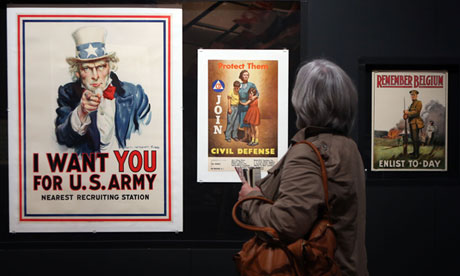Propaganda: Power & Persuasion At The British Library (Review)

The British Library’s summer exhibition purports to focus on the development and use of propaganda in all its insidious forms. From the outset, it is evident that the curators have laudably adopted a broad definition of propaganda embracing efforts to influence the body politic for good or ill. Indeed one of the quotations that greets entrants perhaps comes closest to enunciating the conceptual premise upon which the entire exhibition hangs: “Everything is propaganda”.
As one would expect there is considerable space devoted to propaganda associated with both the Cold War and World War II. Thus, the ubiquitous image of Uncle Sam hangs alongside the iconography of Soviet Russia, Nazi Germany and Chairman Mao’s China.
Thankfully the exhibition carefully avoids a purely historical analysis by interspersing political propaganda with more benign examples of State-sponsored “public guidance”. The inclusion of various public health videos encouraging everything from safer driving to healthier eating habits all point to the way in which propaganda can assume a nuanced sophistication designed to capture the attention of modern audiences.
One particularly chilling section is that concerning the demonisation of so-called State “enemies” through the use of propaganda. Nazi films considering “the Jewish problem” offer a warning of how mass media may be utilised to de-humanise whole sections of a population. All the more alarming is the accompanying observation of Aldous Huxley that “the propagandist is a man who canalises an already existing stream. In a land where there is no water he digs in vain.”
Having adopted a broad approach to the subject matter, visitors will, however, be disappointed to find that there is very little consideration of corporate propaganda. Thus, no reference is made to the contemporary success of global marketing and branding. This omission is all the more surprising in light of the brief and uninspiring treatment of social media at the tail end of the exhibition.
Arguably by eliding the topical and controversial issue of private sector propaganda, the exhibition as a whole misses an important point raised by the documentary-maker and journalist John Pilger in one of the innumerable video clips that line the cavernous PACCAR Gallery: “the most powerful propaganda is insidious; it is public relations”.
Notwithstanding the exclusive focus on State propaganda, this exhibition is a thought-provoking, intelligent examination of the varying techniques employed to manipulate the hearts and minds of the public.
Darragh Connell is a practising barrister in London.
Propaganda: Power and Persuasion runs from 17 May to 17 September 2013 at the British Library, 96 Euston Road, London, NW1 2DB. Entry is £9 for adults with concessions available for students, OAPs and members of the British Library. Free entry for under 18s.









































